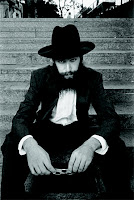The Flip Side of Reactionary Judaism
by: Schvach Yid
Thanks to the YoYenta.com blog site, I’ve been introduced to David Suissa’s article for Jewish Journal.com titled Dumbing Down Judaism at: http://www.jewishjournal.com/home/preview.php?id=17984
I would have left a comment to this post, but to do so one must open a login account (or whatever it’s called), and that’s far beyond my ability. Besides, signing on implies some sort of membership, and that’s absolutely not for me – I hate group dynamics, in any form. I flunked it repeatedly in school, on the job, in the Boy Scouts - you name it. So, in lieu of savvy, I’ll comment here.
Of all the points made in this article, the one that hit home the hardest is about the cost of a Jewish education. The old quip states ‘it’s expensive to be Jewish’ (a play on ‘it’s hard to be a Jew’). No kidding – a frozen kosher chicken is over seven bucks; only Jahrzeit candles are affordable. Jewish philanthropists should indeed throw their money into providing every Jewish child (whose parents so wish) a quality Jewish education, with a strong emphasis on reading and translation of the siddur and Chumash. Without this all important component of a Jewish education, there can be no Judaism.
So what happened? We all know – the Holocaust, and our reaction to our resulting humiliation.
That’s right Jadies and Jents, if you’re just a wee bit perplexed about today’s state of the Jewish mentality, it’s called humiliation. The State of Israel, in its focus on social engineering, has reacted to this defining event of modern Jewish history in ways that have been destructive to that all important goal of the modern Jewish social thinker – Jewish continuity. You know, let’s make it meaningful; how do we adapt Traditional Judaism to the demands of life in the modern world; how can one make this archaic ‘stuff’ meaningful?
Oops – you lose. This approach has demonstrated itself to have been the wrong tack, for what we now have as a Jewish community is nothing of the sort. Like it or not, Judaism is the ‘old stuff’ – the stuff the Israelis rebuke as weak, impotent – the ‘stuff’ of losers. Throw it away, along with its accoutrements – Yiddish, davening, living lives of Torah and mitzvoth, and the old bearded men begging for handouts who never should have had to. Living a Jewish life should never consign its follower to poverty, not BHS (before HaShoah) and not now.
There’re plenty of worthy projects for Jewish philanthropy, and none should include ostentation. Soto Voce is an Italian virtue, and certainly not something we developed in the shtetls. We don’t need large lavish synagogues and halls for our religious functions. These have been surrogates for the real components of Jewish life. My apologies to the ‘sub-Orthodox’ movements of Judaism; you know, the Conservative, Reform, Reconstructionist, Humanistic, and what ever else we’ve dreamed up. Their emphasis has been entirely wrong, for these alternatives to Judaism offer substitutes, not the real thing, and the longer they’ve been at it, the farther they’ve strayed.
By the way, since when is Judaism supposed to be ‘challenging’? I haven’t found that in the Chumash. ‘Challenging’ is not a substitute for Talmud, and no one has to be a ‘Talmud chochom’ – pilpul – to have learned Talmud and live a Jewish life. The Ba’al Shem Tov didn’t teach Judaism as a challenge or as a platform from which to chase ‘Jewish issues’, he taught his followers to become enwrapped in it – the joy and pleasure of living Jewishly, of davening with devikut (connection to Gd). Those who attend a ‘sub-Orthodox’ synagogue/temple should remember this the next time they go to ‘services’ and begin their version of avoda with Eastern-style meditation. Foy, have they missed the boat!
It’s all here folks. It’s a pity we’ve walked away from it, and now we’re paying the heftiest of prices. So to the Jewish philanthropist I say spend your money on Jewish education, not on Jewish buildings. Don’t give your gelt to Jewish universities, and certainly not to the cash- grubbing health care field. No more Jewish names on the sides of hospitals and biomedical research institutions. If you want your names on display, buy garish tombstones for yourselves. Your cash should educate Jews of all ages in traditional Judaism, without the ‘challenging’ social bs. The world Jewish community will be much improved, and stronger, as a result of your generosity.
One last point. I think Yo Yenta is right when she suggests that philanthropists, and others, should concentrate efforts on Jews who are in Judaism rather than chasing those who have chosen to reject it. Many, many Jews have opted out of Judaism - they see no value in it. Lot's of comments have been made to me by disaffected Jews against our religion and community. So be it!














